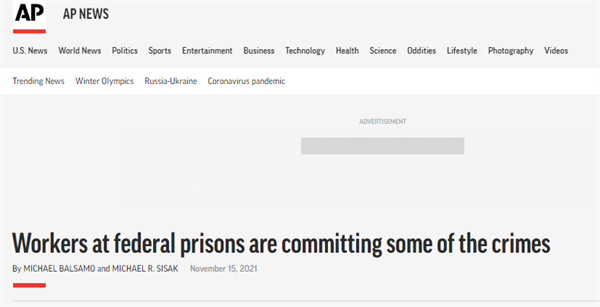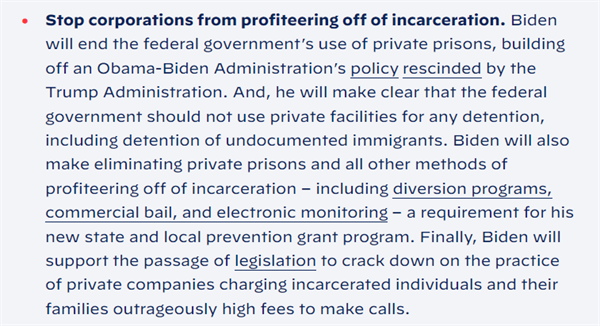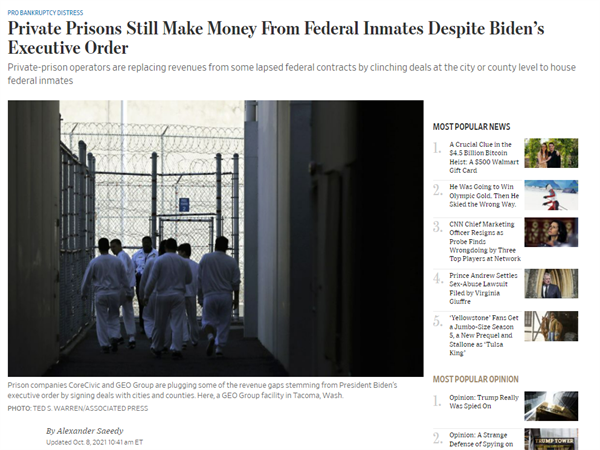‘Beacon of democracy’ turns out to be living hell of modern slavery
Private prisons in the U.S., as both a lucrative business and a kind of modern nightmare, epitomize the real human rights situation in the U.S., a country self-styled as a “beacon of democracy.” While the operators of these prisons make a ton of money, the incarcerated suffer from forced labor, abuse, as well as other types of human rights violations.
Notorious land of sweatshops
With 5 percent of the world’s population and a quarter of all incarcerated people in the world, the U.S. has witnessed how private prisons, which sprang up in the 1980s, have expanded rapidly over the past decades.
Private prisons in the U.S. sign contracts with the federal government and local governments to provide inmate services, and get paid based on the number of prisoners they house.
Besides receiving government subsidies, private prisons throughout the country also profit from forced labor. In 2020, inmates in private prisons around the U.S. produced more than one million U.S. dollars’ worth of commodities, including face masks and hand sanitizer, but were paid far less than the statutory minimum hourly wage in the country.
Private prison inmates in the U.S. face atrocious working conditions, a result of the operators’ efforts to reduce operating costs. Due to poor health service capacity, the number of COVID-19 cases soared rapidly in private prisons in the U.S. since the first wave of the pandemic.
As COVID-19 spread across the country in 2020, inmates in a women’s prison in Chino, California, the U.S., were forced to work overtime to stitch together masks, but were forbidden from wearing them, according to an article published on the website of the Los Angeles Times in October 2020, which said that in the end 352 inmates and 85 staffers had been infected with the coronavirus at the prison.
Instances of corruption, among other types of scandals at private prisons in the U.S., such as prison breaks and the death of inmates, often come into public view under the spotlight. An investigation conducted by the Associated Press (AP) revealed that more than 100 federal prison workers have been arrested, convicted or sentenced for crimes since the start of 2019, according to an article published on the website of the news agency in November 2021.

An article about an Associated Press investigation into criminal offences committed by federal prison workers published in November 2021. (Screenshot of the website of The Associated Press)
Cash cow sustained by money-tainted politics
The tentacles of capital couldn’t have spread so widely in the private prisons of the U.S. without a deep-rooted network of collusion between politicians and businesses.
Private prisons in the country spend huge amounts of money on lobbying. They gain support from politicians by making political contributions to help certain candidates with their election campaigns.
Between 2010 and 2015, CoreCivic and the GEO Group, major private prison operators in the U.S., spent $14.6 million on funding political activities and lobbying.
Politicians who receive money from private prisons will leave their doors wide open so that private prison operators are provided with a means to affect the formulation of policies impacting the criminal justice system and relevant legislation across the country.
Policies rolled out by the U.S. government, including those on the privatization of prisons and shortening the procedures for criminal trials, have created favorable conditions for further expanding the number of inmates and lengthening prison sentences in private prisons.
Private prisons have also fueled judicial corruption in the country. Driven by personal interests, some judges bend the law for personal gain and deliberately put defendants who otherwise would not need to serve a sentence into private prisons to increase their revenue.
Backed by government policies and regulations, private prison operators have quickly made a fortune. Within the short span of merely 10 years after its incorporation, CoreCivic went public at the New York Stock Exchange.
During his presidential election campaign, U.S. President Joe Biden promised to shut down privately-run immigrant detention centers. And in the first week after he took office, Biden signed an executive order directing the Department of Justice to refrain from renewing its contracts with private prisons.

An excerpt from an article titled “The Biden Plan For Strengthening America’s Commitment to Justice.” (Photo/Official website of Joe Biden)
However, private prisons’ paths to continue their business operations were not actually blocked by the executive order. The Moshannon Valley Correctional Center, a former private prison operated by the GEO Group, for instance, was closed in March 2021 as a result of the executive order, but then reopened with a new legal identity in November of the same year after renewing a contract with U.S. Immigration and Customs Enforcement.
In addition, BI Incorporated, a subsidiary of the GEO Group, will cooperate with the U.S. Department of Homeland Security to operate a new U.S. pilot program targeting migrants caught crossing the U.S.-Mexico border, Reuters reported on Feb. 16.

An article published on the website of The Wall Street Journal points out that the Biden administration’s executive order directing the Justice Department not to renew any expiring contracts with privately-operated detention facilities hasn’t in fact prevented private prisons from continuing to profit from their provision of inmate services, October 2021. (Screenshot of the website of The Wall Street Journal)
Hotbed of modern slavery
Early in 1865, the 13th Amendment to the U.S. Constitution passed by the U.S. Congress abolished slavery and involuntary servitude, except as punishment for a crime. The amendment created an opening for forced labor to be legally revived inside the country’s private prisons, and has gradually evolved into a form of modern slavery.
The spread of “Convict leasing,” a system of forced penal labor, in the U.S. after the Civil War has resulted in frequent abuses of prisoners in privately-run prisons, but local governments have nonetheless continually turned a blind eye to this phenomenon, as pointed out by the veteran undercover American journalist Shane Bauer in his book “American Prison: A Reporter’s Undercover Journey into the Business of Punishment.”
As a matter of fact, private prisons are merely the tip of the iceberg when it comes to labor-related issues in the U.S., where such phenomena as forced labor, debt slavery, and human trafficking have emerged in an endless stream.
In its annual “Trafficking in Persons Report,” the U.S. State Department conceded that the U.S. is “a source, transit, and destination country for men, women, transgender individuals, and children – both U.S. citizens and foreign nationals – subjected to sex trafficking and forced labor.”
Up to this day, the U.S. still shirks its responsibilities for ensuring labor protections and remains reluctant to ratify core conventions of the International Labor Organization, despite widespread criticism of its labor rights violations at the 109th Session of the International Labor Conference held in June 2021.
Photos
 Beyond record golds, China witnesses inspiring breakthroughs at Beijing 2022
Beyond record golds, China witnesses inspiring breakthroughs at Beijing 2022 In pics: closing ceremony of Beijing 2022 Olympic Winter Games
In pics: closing ceremony of Beijing 2022 Olympic Winter Games Gu wins women's free ski halfpipe, her second gold for China at Beijing 2022
Gu wins women's free ski halfpipe, her second gold for China at Beijing 2022 Beijing 2022 mascot Bing Dwen Dwen rises as an Olympic star as irresistibly cute design wins widespread acclaim
Beijing 2022 mascot Bing Dwen Dwen rises as an Olympic star as irresistibly cute design wins widespread acclaim
Related Stories
- U.S. has long history of medical abuse of imprisoned minorities: The Guardian
- Future of U.S. democracy chancy as states battle over voting rights: report
- Anti-Asian hate crimes plague Washington, D.C.: Axios
- Domestic violence shelter in U.S. city says cases more severe during pandemic: report
- Russia expels U.S. deputy chief of mission in retaliation
Copyright © 2022 People's Daily Online. All Rights Reserved.






